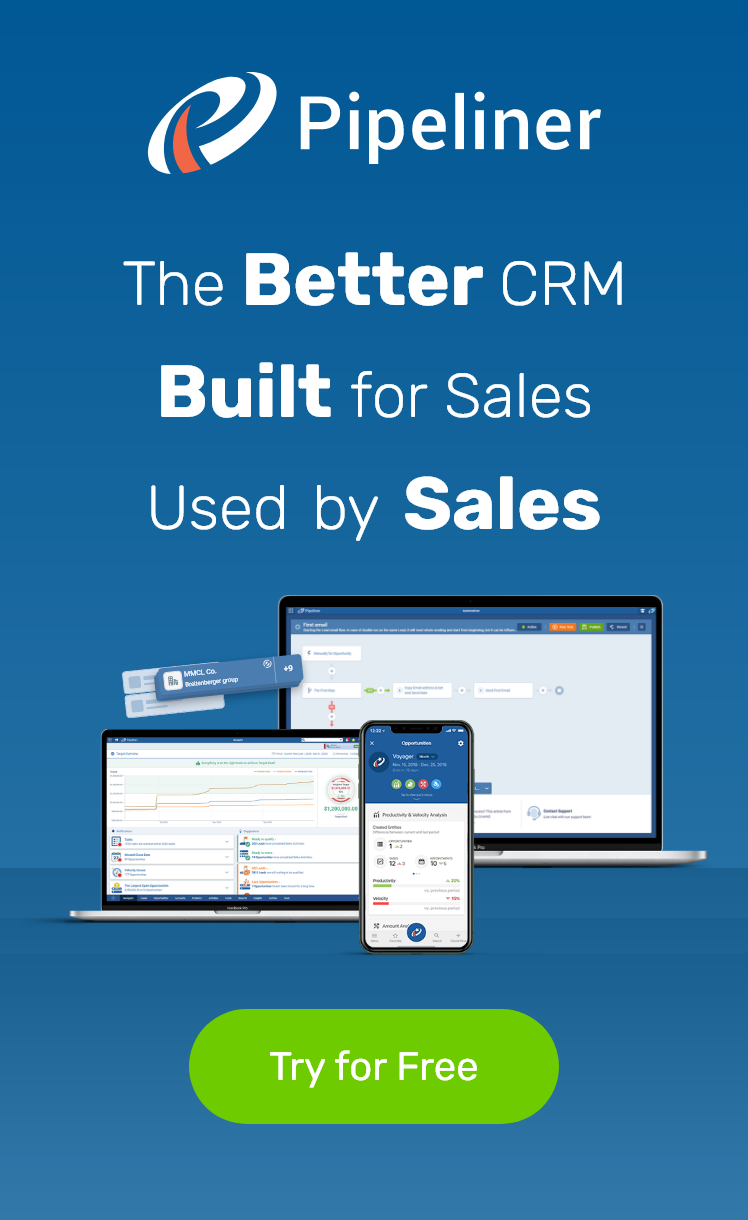
Rackham first gained international recognition in the 1970s when he led the largest ever research study of successful selling and sales effectiveness. The research took 12 years at a cost, in today’s dollars, of $30 million. From the results of these studies he published the groundbreaking classic SPIN SellingSPIN Selling SPIN Selling is an acronym for four types of questions (Situation, Problem, Implication, Need-payoff) a sales professional should ask a prospect to establish a customer-centric selling paradigm and increase closing rate..
What is SPIN Selling…and How Can Pipeliner CRM Help?
Find out how Pipeliner CRM can totally empower your SPIN Selling efforts. Try our free trial.
The name SPIN Selling comes from a highly influential book with that same title by Neil Rackham, originally published in 2000. It is a selling methodology that is now taught globally and has been echoed and forwarded in many publications since.
SPIN Selling was developed following the careful observation, by sales experts, of 35,000 sales calls. Through this observation, it became clear that the quality of questions asked by a salesperson where key to the success of a sale. The right questions could speed up the process, whereas the wrong questions could stall it or even halt it completely.
The term SPIN is an acronym of four different types of sales questions designed to bring a prospect into interest and through to a sale:
- SITUATION questions
- PROBLEM questions
- IMPLICATION questions
- NEED-PAYOFF questions
Let’s examine each of these types in more detail.
Situation Questions
The answers to Situation questions form the foundation of a sales cycleSales Cycle Sales Cycle is a repeating process characterized by a predictable sequence of stages that a company undergoes as it sells its products and services to customers.. The purpose of these questions is to develop an understanding of the prospect and their precise situation (hence the name) as regards an offering such as yours.
Examples of Situation questions:
- How do you currently manage your customerCustomer Customer is an individual or an organization that purchases a product or signs up for a service offered by a business.’s contact details?
- How do you keep track of what’s happening in your sales pipelineSales Pipeline Sales Pipeline is a type of visualization showing the status of each sales prospect in the customer life cycle or sales process.?
- How do you maintain an overview of how your individual sales reps are performing?
The information obtained from these questions is used throughout the remainder of the sales cycle.
Of course the more research you do prior to the initial conversation, the more intelligent and precise your questions will be—and the more useful data you will gather.
Problem Questions
The idea behind Problem questions is to bring the prospect into an awareness that there is a problem or problems that need to be solved. These problems and issues are what you will gently but firmly use to drive the sale forward.
Problem questions are also effective at causing a prospect to identify issues that might have been otherwise overlooked.
Examples of Problem questions:
- Was the amount of training you needed to get up and running with your CRM ever a problem?
- Do you find it’s expensive adding new users to your CRM?
- What’s the biggest problem you’re facing so far when managing your sales pipeline?
Implication Questions
Implication questions are designed to shine a light on the potential impact of the problems and issues named in the Problem questions are not addressed.
Correctly phrased and asked, Implication questions clearly demonstrate to the prospect in their own mind that the problems really need to be solved, sooner rather than later.
Examples of Implication questions:
- If leads don’t get input into your CRM system, what’s the impact on your sales outlook?
- If training on your CRM is costly and time-consuming, what does that mean for new reps when they start?
- If you can’t accurately see your performance to date, how much response time do you have to implement a fix if you anticipate your sales are falling short of a target?
Need-payoff Questions
Now that you’ve brought your prospect to the realization of how the situation will only deteriorate if it isn’t solved, you then want to get them considering how valuable a real solutionSolution Solution is a combination of ideas, strategies, processes, technologies and services that effectively helps an organization achieve its goals or hurdle its challenges. to the problem or problems would be. That is the point of the Need-payoff questions.
Examples of Need-payoff questions:
- Why is being able to have a big picture overview of your sales pipeline important to you?
- If you could cut the amount of time spent training new staff on your CRM, what impact would that have?
- If you could see the opportunities in your pipeline at a glance, how would that help you achieve your sales targets?
The secret to getting results with need-payoff questions is to ensure the buyerBuyer A buyer is an individual or organizational entity that purchases a product or subscribes to a service. specifies the benefits themselves. Encourage them to visualize, and imagine the difference with that problem solved.
The beauty of these questions is that if you get them right, your customer will tell you how your productProduct Product refers to anything (an idea, item, service, process or information) that meets a need or a desire and is offered to a market, usually but not always at a price. will help.
Need-payoff questions need to evoke positive emotions. After all, it feels good to know that a pressing problem can finally be solved.
Effective CRM: A Vital Necessity
In order for SPIN Selling to be truly effective, it requires a highly efficient CRM solution.
- As you gather dataData Data is a set of quantitative and qualitative facts that can be used as reference or inputs for computations, analyses, descriptions, predictions, reasoning and planning. throughout your questioning, you need to record it so that it can be instantly retrieved, as you make your way through the sales cycle.
- The answers to SPIN questions fall into one or another of the steps of your sales processSales Process Sales Process is a series of strategic steps or a set of activities aimed at driving sales growth through the alignment of personnel, market insight, methodologies, relevant business units, and technology.. Your CRM solution should exactly mirror your sales process so the answers fall into the same places, every time.
- Your sales process stages should be mapped out as precisely as possible, with the SPIN questions that should be asked in each stage, the answers that need to be obtained in each stage, and the buyer and seller actions laid out that will result in the sale moving to the next stage.
With its completely visual, intuitive functionality, Pipeliner CRM meets and exceeds these qualifications and more.
Find out how Pipeliner CRM can totally empower your SPIN Selling efforts. Try our free trial.
SPIN is a registered trademark of MHI.

